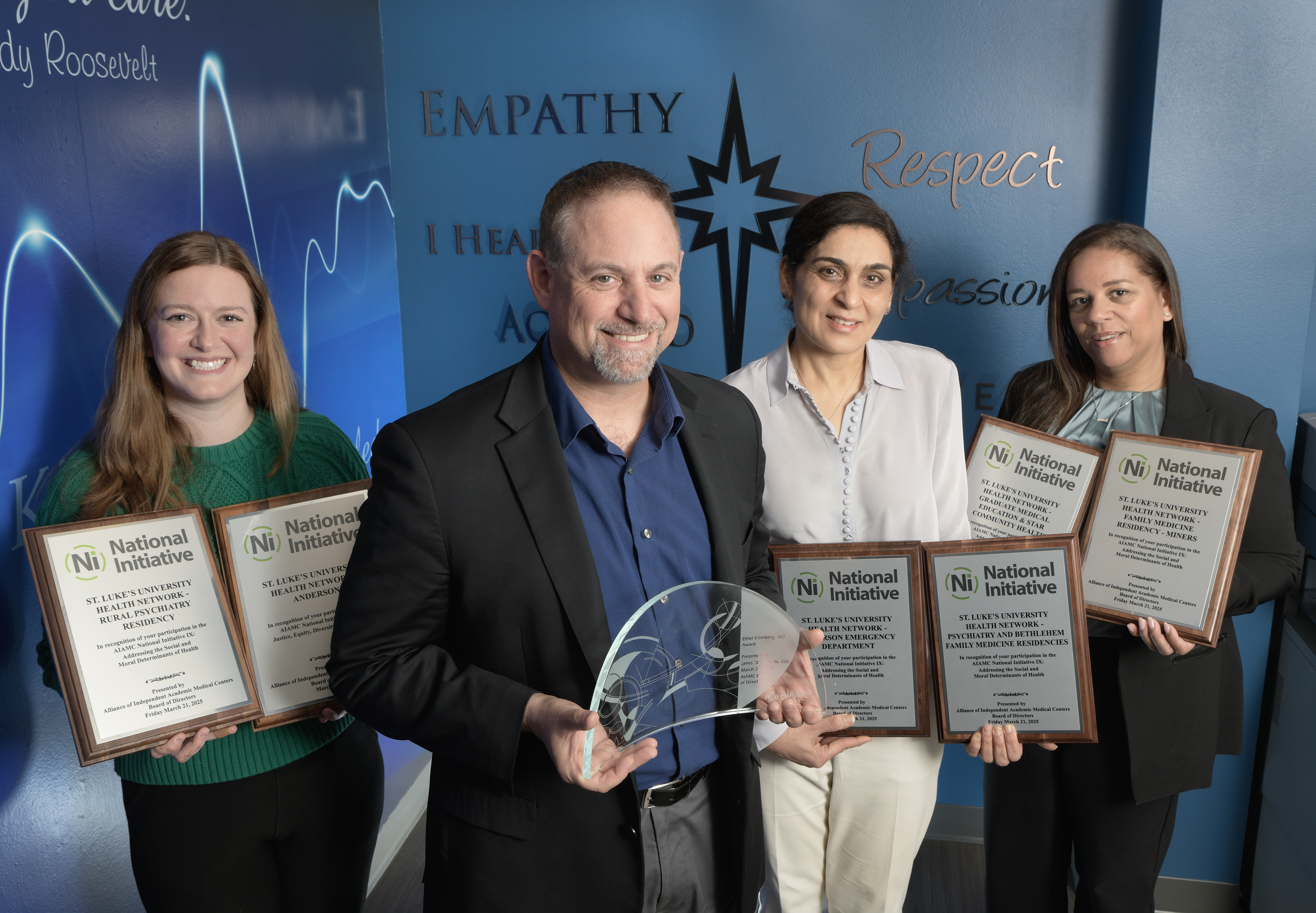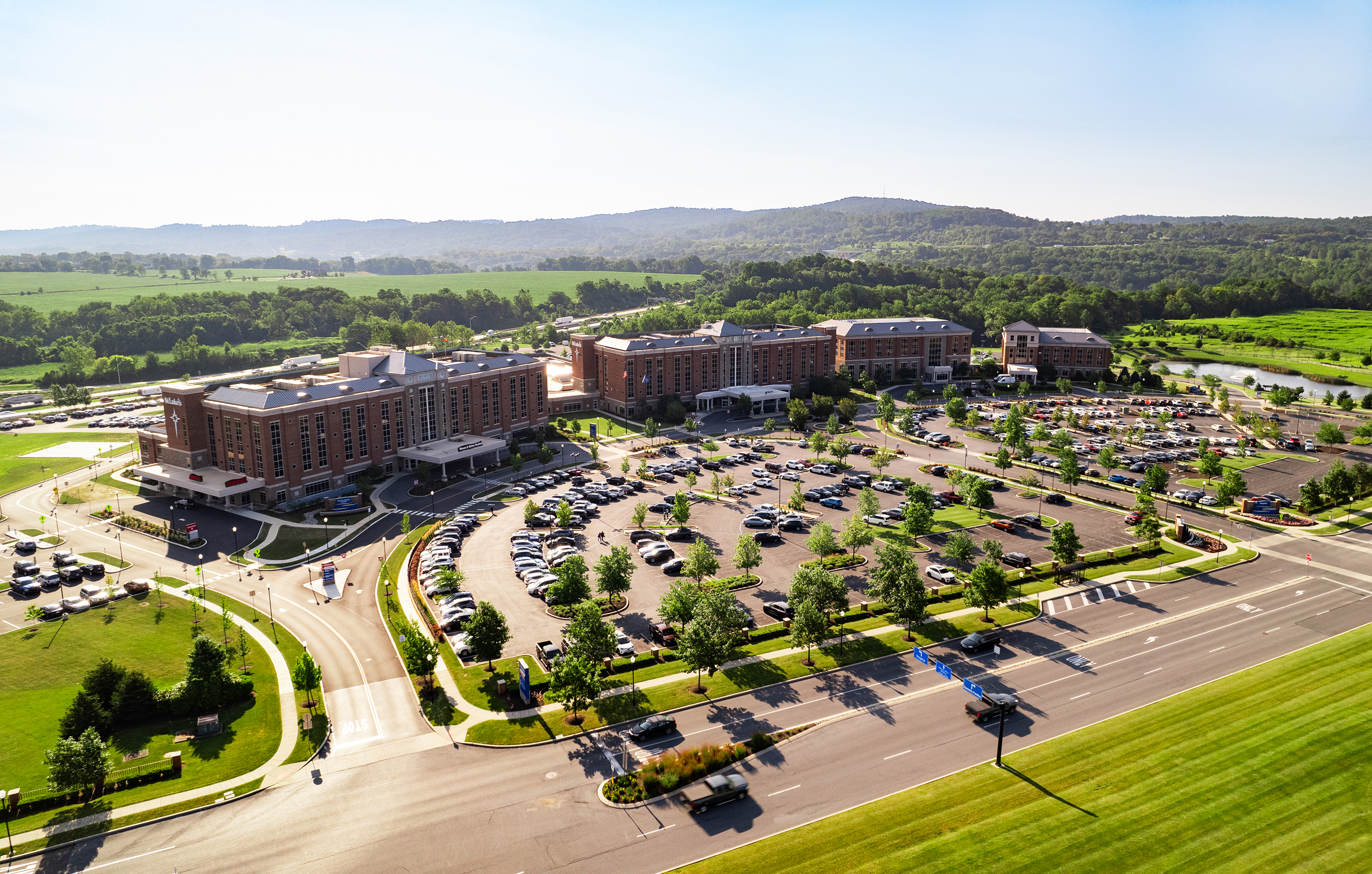Canola Field Promoting Health and Well-Being at Anderson Campus
July 09, 2021

The spectacular new 80-acre field of vibrant yellow canola at St. Luke’s Anderson Campus conveys feelings of peace and serenity and the comfort of natural beauty.
The spring canola, with its bright yellow flowers that bloom in mid-May, not only attracts beneficial insects, such as honey bees and other pollinators, but it also brings in people looking for tranquility or, in many cases, selfies and family photos amid the golden expanse.
“A staff member was out at the canola field recently when a car pulled up and a visitor got out,” says Ed Nawrocki, President of St. Luke’s Anderson Campus. “The person looked at the canola and said, ‘This is healing.’ It really is stunning and reinforces the fact that St. Luke’s Anderson Campus is a place of healing, beauty and positive energy.”
The planting of the canola field is just the latest way St. Luke’s has used the land at the Anderson Campus to nourish individuals and families and promote physical and mental well-being. Among the campus’ other agricultural and landscape features are an organic garden, a sunflower garden, walking trails, a community garden and cherry trees that were recently planted around the pond.
“We are stewards of this property,” Nawrocki explains. “As such, we want to use this land to make the Anderson Campus a destination for the community that extends beyond our exceptional healthcare. We want all visitors—whether they are patients, employees, members of the community or others—to have a fulfilling experience here.”
For the employees and staff of St. Luke’s Anderson Campus, the beauty of and the focus on wellness through initiatives like the organic garden and the planting of the canola field are a source of great pride.
“St. Luke's Anderson Campus provides a serene and safe place to come together, not just as provider and patient, but as colleagues and community members to enrich each other's experiences,” says Ileana Perez-Figueroa, MD/MPH, who works at the St. Luke’s Anderson Campus.
“The attention to detail here demonstrates that St. Luke's aims to address many aspects of well-being, including social connectedness, nutrition, mental health, and physical health. Even on the busiest of days, the moment I start walking to my car after a shift, the beautiful mountain views and canola fields always bring a smile to my face.”
Now in its seventh year, the organic farm has grown out of partnership between St. Luke’s and the Rodale Institute. In a unique initiative, the St. Luke’s Rodale Institute Organic Farm grows fruits and vegetables that are used in cafeterias in all hospitals throughout the St. Luke’s University Health Network.
In 2020, the St. Luke’s Rodale Institute Organic Farm—which is on 12 acres of land—grew approximately 50,000 pounds of produce.
“We provide approximately 200 farm shares weekly with high-quality, nutrient-dense foods to employee wellness, the clinical trials, and wholesale orders to the cafeterias,” explains Aslynn Parzanese, Interim Manager of the St. Luke’s Rodale Institute Organic Farm.
This year, the organic farm is growing a great variety of vegetables.
“Some of my favorites are beets, sweet potatoes, fennel, garlic and sunflower sprouts,” Parzanese says.
Other crops that have been grown on the farm include lettuce/salad greens, broccoli, tomatoes, peppers, melons, cucumbers, summer squash, Swiss chard and kale, garlic, cabbage, potatoes and herbs.
Last year, St. Luke’s also started a resident-led CSA project for hypertensive and diabetic patients from various continuity clinics.
“This project enabled patients with poorly controlled blood pressure and diabetes to obtain free weekly shares, along with recipes to use for cooking the produce,” Dr. Perez-Figueroa adds. “Any shares that were not picked up by participants were donated to local schools and food pantries, which allowed St. Luke's to strengthen its presence and partnership within the Lehigh Valley community. Innovation such as this shows St. Luke's commitment not only to community health, but to setting an example and a new standard for all health networks about what the ‘care’ in healthcare truly means.”
Parzanese points out that previous farm managers transitioned from conventional farmland into organic vegetable production.
“It is my intention to proceed with more regenerative farming practices, rather than plasticulture,” she says, referring to the practice of using plastic materials in agricultural applications.
“We can then complete the cycle—healthy soil, healthy foods, healthy people.”
St. Luke’s use of the land at the Anderson Campus to nourish and strengthen the minds and bodies of patients, employees, staff, members of the community and others is strategic and the benefits ripple throughout the entire network.
“I believe that farm-institution is what preventive health is all about,” Parzanese explains.
“Historically, folks have had to intentionally seek out organic produce. Now, with programs such as this, we can educate through personal experiences that organic is so vital to our health. And those families who have been local organic consumers now have better access to organic produce.”
Adds Dr. Perez-Figueroa: “Having these benefits shows St. Luke's commitment and dedication to all members of its community. It is certainly rare that you see such an emphasis on lifestyle medicine within a network. The ability to provide fresh produce in the hospital cafeteria, at the dinner table of employees and in the home for clinic patients highlights just how far a healthcare system can reach when the priority is the community.”
Media Contact:
Sam Kennedy, Corporate Communications Director, 484-526-4134, samuel.kennedy@sluhn.org
About St. Luke’s
Founded in 1872, St. Luke’s University Health Network (SLUHN) is a fully integrated, regional, non-profit network of more than 17,000 employees providing services at 12 hospitals sites and 300+ outpatient sites. With annual net revenue in excess of $2.7 billion, the Network’s service area includes 10 counties: Lehigh, Northampton, Berks, Bucks, Carbon, Montgomery, Monroe and Schuylkill counties in Pennsylvania and Warren and Hunterdon counties in New Jersey. Dedicated to advancing medical education, St. Luke’s is the preeminent teaching hospital in central-eastern Pennsylvania. In partnership with Temple University, St. Luke’s established the Lehigh Valley’s first and only regional medical school campus. It also operates the nation’s longest continuously operating School of Nursing, established in 1884, and 38 fully accredited graduate medical educational programs with 347 residents and fellows. St. Luke’s is the only Lehigh Valley-based health care system to earn Medicare’s five-star ratings (the highest) for quality, efficiency and patient satisfaction. St. Luke’s is both a Leapfrog Group and Healthgrades Top Hospital and a Newsweek World’s Best Hospital. U.S. News & World Report ranked St. Luke’s #1 in the Lehigh Valley and #6 in the state. Three of IBM Watson Health’s 100 Top Hospitals are St. Luke’s hospitals. St. Luke’s flagship University Hospital has earned the 100 Top Major Teaching Hospital designation from IBM Watson Health nine times total and seven years in a row, including in 2021 when it was identified as THE #1 TEACHING HOSPITAL IN THE COUNTRY. In 2021, IBM Watson Health also named St. Luke’s among the 15 Top Health Systems nationally. Utilizing the Epic electronic medical record (EMR) system for both inpatient and outpatient services, the Network is a multi-year recipient of the Most Wired award recognizing the breadth of the SLUHN’s information technology applications such as telehealth, online scheduling and online pricing information. St. Luke’s is also recognized as one of the state’s lowest cost providers.
Read More NewsLatest News


April 10, 2025
National Recognition for SLUHN Graduate Medical Education

April 09, 2025
In Safe Hands Award

April 08, 2025